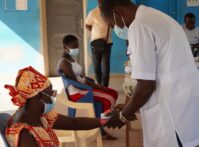Over the last three days, 700 technical experts have provided solutions to decrease maternal mortality. In the last year, governments have committed billions of dollars to implement such solutions. Yet, we’ve been here before, reminded Sigrun Mogedal of the Norwegian Ministry of Foreign Affairs during the final plenary session of the
Global Maternal Health Conference. “Just look at
ICPD,
Beijing, and
CEDAW. Obviously, there must be something wrong with accountability,” she said, since 15 years later women continue to die every minute giving birth.
Wrapping up the conference with a discussion of accountability makes sense – we need to learn from the past and close the gap between commitments made and real action on the ground. So what does today’s buzzword, “accountability,” mean, and how do we enforce the realization of commitments made…or lack thereof?
“Accountability is power, and includes transparency, answerability, and enforceability,” said Lynn Freedman of Columbia University. Through international law, budget transparency, and grassroots mobilization it is possible to ensure that policies make a difference to improve women’s lives.
A review of the Ministry of Finance’s allocation for health can tell us a lot about the government’s real commitment to eradicating maternal mortality. As the overarching instrument of policy the “budget is inextricably linked to development and exists for those who have less,” said Helena Hofbauer of the International Budget Project. “If there were greater transparency of government spending, we could have done more to push for change five years ago,” said Hofbauer. This is indeed true; however, it is also true that if governments simply followed through on the international agreements they are signatories to, women would be better protected.
Accountability through the legal system is possible and Nancy Northrup of the Center for Reproductive Rights demonstrated how international law has overhauled programs and sparked governments into action. For example, in India, the high court recently ruled that the government must execute audits and report back on the steps taken to align programs with policies that ensure a woman’s right to skilled birth attendance.
In order to bring about such judicial interventions a social movement must first be in place to build awareness and demand accountability. Building such a movement starts at the grassroots level and Aparajita Gogoi of CEDPA presented strategies for empowering local communities with a global voice. By providing a safe space for dialogue, communities are given the opportunity to share concerns and demand action from local health facilitators and government officials.
Increasing opportunities for dialogue allows for bottom up solutions and ensures that contextual variables are taken into consideration. “We need arenas for brokering diverse groups to compare notes and streamline synergies, ” said Mogedal. I am energized by the lessons learned today and eager to apply these key messages next week in Washington, DC during the seventh meeting of the Advancing Policy Dialogue for Maternal Health at the Woodrow Wilson International Center for Scholars that will further address “Monitoring, Transparency, and Accountability for Maternal Health.”
Originally posted on the Medscape blog Global Mamma, by Calyn Ostrowski of the Woodrow Wilson International Center for Scholars, Coordinator of the Maternal Health Dialogue Series in partnership with the Maternal Health Task Force and UNFPA.
Photo Credit: “Mothers and children waiting at the Bolemba healt centre” courtesy of flickr user hdptcar.
 A Publication of the Stimson Center.
A Publication of the Stimson Center.








